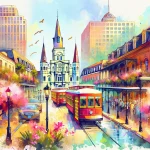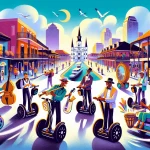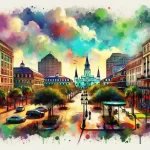New Orleans is the birthplace of jazz, a musical genre that has captivated audiences worldwide with its soulful melodies, intricate rhythms, and improvisational spirit. From the lively streets of the French Quarter to the historic neighborhoods, the city’s music scene is a vibrant testimony to its rich cultural heritage.
In This Article
TL;DR
- New Orleans played a pivotal role in the origins and evolution of jazz music.
- The city boasts a variety of iconic jazz clubs and venues, each offering a unique and authentic experience.
- Visitors can immerse themselves in the local music scene, explore the city’s musical history, and engage with the vibrant jazz community.
Historical Context of Jazz in New Orleans
Jazz music has its roots deeply intertwined with the cultural fabric of New Orleans. In the late 19th century, the city’s melting pot of African, European, and Caribbean influences gave birth to a new musical form that would forever change the course of American music.
Origins of Jazz in New Orleans
The origins of jazz can be traced back to Congo Square, a historic gathering place where enslaved Africans would come together to play music, dance, and celebrate their cultural traditions. The rhythmic beats of bamboula drums, the soulful melodies of horns, and the infectious energy of the dancers laid the foundation for what would become known as jazz.
Evolution of Jazz
As jazz evolved, New Orleans played a pivotal role in shaping its sounds and styles. From the early days of ragtime and Dixieland to the emergence of swing and bebop, the city’s musicians pushed the boundaries of improvisation and experimentation, leaving an indelible mark on the genre.
Key Figures in New Orleans Jazz History
New Orleans has produced some of the most influential and iconic figures in jazz history. Louis Armstrong, the legendary trumpeter and vocalist, is often hailed as one of the most important musicians of the 20th century. His innovative style and virtuosic performances helped define the sound of jazz. Other notable figures include Jelly Roll Morton, Sidney Bechet, and King Oliver, whose contributions continue to inspire generations of musicians.
Iconic Jazz Clubs and Venues
New Orleans is home to a vibrant and variety of jazz clubs and venues, each offering a unique and authentic experience for music lovers.
Preservation Hall
Preservation Hall is a true institution in the French Quarter. Established in 1961, this intimate venue has become a mecca for traditional New Orleans jazz, featuring performances by the world-renowned Preservation Hall Jazz Band and other local musicians. The hall’s weathered walls and candlelit ambiance transport visitors back in time, creating an unforgettable atmosphere.
The Spotted Cat Music Club
Located on the lively Frenchmen Street, The Spotted Cat Music Club is a beloved destination for contemporary jazz enthusiasts. With its cozy interior and lively outdoor patio, the club offers a diverse lineup of local and touring acts, showcasing a range of jazz styles from traditional to avant-garde.
Tipitina’s
Tipitina’s is a legendary landmark that has played a pivotal role in the city’s music scene for decades. Originally established as a venue for Professor Longhair, a pioneering figure in New Orleans rhythm and blues, Tipitina’s has since become a hub for musical innovation and experimentation. From jazz to funk and everything in between, this iconic club continues to attract music lovers from around the world.
Experiencing Live Jazz: What to Expect
Immersing yourself in the live jazz scene of New Orleans is an experience like no other. From the moment you step into one of the city’s iconic clubs, you’ll be enveloped in an atmosphere that celebrates the rich musical heritage and vibrant energy of the city.
Atmosphere and Audience
The atmosphere in New Orleans jazz clubs is electric, with a palpable sense of excitement and anticipation in the air. The audience is a diverse mix of locals and visitors, united by their love for the music. Whether you’re a seasoned jazz aficionado or a newcomer to the genre, you’ll find yourself swept up in the infectious energy of the crowd.
Music Styles and Performances
New Orleans is a melting pot of jazz styles, from the traditional sounds of Dixieland and swing to the more contemporary expressions of modern jazz and fusion. Live performances often feature a combination of virtuosic solos, tight ensemble playing, and spontaneous improvisation, showcasing the incredible talent and creativity of the musicians.
Interaction with Artists
One of the unique aspects of the New Orleans jazz scene is the opportunity for audience engagement and interaction with the artists. Many clubs encourage audience participation, whether through dancing, clapping along, or even joining the musicians on stage for an impromptu jam session. This sense of community and shared experience is what makes the city’s music scene truly special.
Planning Your Visit to New Orleans Jazz Clubs
To fully immerse yourself in the vibrant jazz scene of New Orleans, it’s essential to plan your visit carefully and make the most of your time in the city.
Best Times to Visit for Live Jazz
While live jazz can be found in New Orleans throughout the year, certain times offer a particularly rich and diverse musical experience. The annual New Orleans Jazz & Heritage Festival, held in late April and early May, is a must-attend event for music lovers, featuring an incredible lineup of local and international acts. Additionally, the city’s many festivals and celebrations, such as Mardi Gras and the French Quarter Festival, provide ample opportunities to experience live jazz in its most authentic and vibrant form.
Entry Requirements and Ticket Advice
Many of New Orleans’ jazz clubs and venues have varying entry requirements and ticket policies. Some may require advance ticket purchases, while others operate on a first-come, first-served basis. It’s always advisable to check the venue’s website or call ahead to inquire about entry requirements, cover charges, and any age restrictions.
Accessibility and Accommodations
New Orleans is a city that prides itself on its inclusivity and accessibility. Many jazz clubs and venues offer accommodations for visitors with disabilities, such as wheelchair access, assistive listening devices, and designated seating areas. It’s always a good idea to inquire about accessibility options when planning your visit.
Getting Around New Orleans
Navigating the city’s vibrant music scene can be a challenge, but with the right transportation options and planning, you can easily explore the various jazz clubs and venues.
Transportation Options
New Orleans offers a variety of transportation options to suit different needs and preferences. The city’s iconic streetcars provide a convenient and scenic way to travel, while ride-sharing services like Uber and Lyft offer a more flexible option. For those who prefer to explore on foot, the French Quarter and surrounding neighborhoods are highly walkable, with many jazz clubs and venues within close proximity.
Navigating the City
When planning your jazz club visits, it’s essential to consider the city’s layout and traffic patterns. The French Quarter and surrounding areas can become quite congested, especially during peak hours and major events. It’s advisable to plan your routes in advance, allowing ample time for travel and parking. Many jazz clubs offer valet parking or have nearby public parking lots, making it easier to navigate the city’s bustling streets.
Deep Dive into Venue-Specific Offerings
While the live music experience is the main draw, many of New Orleans’ jazz clubs and venues offer additional amenities and experiences to enhance your visit.
Food and Drink Options
From classic Creole cuisine to innovative fusion fare, New Orleans is a culinary paradise. Many jazz clubs and venues offer a range of dining options, from casual snacks and small plates to full-service restaurants. Be sure to inquire about the venue’s food and drink offerings, as some may have specific menus or specials during live music performances.
Special Events and Jazz Nights
In addition to regular live music performances, many venues host special events and themed jazz nights throughout the year. These can range from tribute shows honoring legendary musicians to themed parties and festivals. Checking the venue’s event calendar can help you plan your visit around these unique experiences.
Engaging with the Local Jazz Community
New Orleans’ jazz scene is more than just a collection of venues and performances; it’s a vibrant and inclusive community that welcomes visitors to immerse themselves in the city’s musical heritage.
Workshops and Jam Sessions
For those looking to deepen their appreciation and understanding of jazz, many venues and organizations offer workshops, masterclasses, and jam sessions. These interactive experiences provide opportunities to learn from seasoned musicians, hone your skills, and connect with fellow jazz enthusiasts.
Community Support and Sustainability
By attending live performances and supporting the local jazz clubs and venues, visitors play a crucial role in sustaining the city’s rich musical tradition. Many of these establishments rely on the patronage of music lovers to continue operating and providing a platform for local artists. By engaging with the community and supporting these cultural institutions, you contribute to the preservation and growth of New Orleans’ jazz legacy.
New Orleans’ music scene is a tapestry woven with the threads of history, culture, and artistic expression. From the iconic jazz clubs to the vibrant street performances, the city offers a truly immersive and unforgettable experience for music lovers of all backgrounds. By exploring the venues, engaging with the local community, and embracing the infectious energy of live jazz, visitors can become part of the city’s enduring musical legacy.






